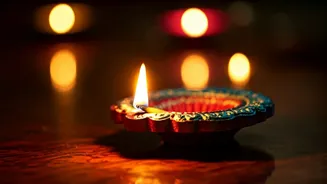Celebrating Triumph, Renewal
Diwali, often recognized as the festival of lights, symbolizes the victory of good over evil, and the triumph of light over darkness. Celebrated with immense
enthusiasm throughout India and by the Indian diaspora globally, Diwali is more than just a festival. It's a time for family reunions, the exchange of gifts, and the decoration of homes with vibrant lights and rangoli. The core of Diwali lies in its stories, particularly those surrounding the return of Lord Rama to Ayodhya after fourteen years of exile, defeating Ravana. The joyous celebrations that followed his return, marked by the lighting of diyas to illuminate his path, continue to be reenacted through this festival. Diwali also signifies a time for renewal, both personally and communally, often coinciding with the start of a new financial year in certain communities. The significance of Diwali varies across regions, but hope and the eventual victory of good are common threads binding all celebrations together, making Diwali a universal festival representing values of life and hope.
Stories of Tradition
The tales associated with Diwali are varied and rich, reflecting the diverse cultural tapestry of India. The most prominent story revolves around the epic Ramayana. This narrative describes the journey of Lord Rama, his wife Sita, and his brother Lakshmana, as they undergo fourteen years of exile and confront the demon king Ravana. Rama's eventual victory and his return to Ayodhya is commemorated by the lighting of diyas, creating an atmosphere of festivity and joy. However, other regional narratives also shape Diwali observances. In some parts of India, the story of Krishna defeating the demon Narakasura is celebrated, underscoring the triumph of good over evil. The Jain community marks Diwali as the day Lord Mahavira, the 24th Tirthankara, attained enlightenment. This variety in legends adds layers to the celebration of Diwali, creating a vibrant representation of different traditions, but always emphasizing the core themes of hope, renewal, and the strength of righteousness.
Modern Echoes of Hope
While the ancient narratives of Diwali provide a firm foundation, the festival has also seen the birth of contemporary stories, that emphasize the modern relevance of the festival’s themes. Many of these contemporary stories focus on the themes of overcoming adversity and embracing new beginnings. They often highlight individuals who, like the characters in the traditional tales, demonstrate courage, resilience, and compassion. These narratives, often portrayed through film, literature, and social media, resonate with modern audiences, reinforcing the timeless values of the festival. Modern storytelling allows for a wider audience to understand and connect with the heart of Diwali. These narratives not only pay homage to the rich cultural background but also encourage the younger generation to embrace the significance of Diwali in a modern context. Through these stories, the spirit of Diwali continues to inspire and evolve, making the festival relevant in both old and new times.
Lights, Colors, Celebrations
The visual spectacle of Diwali is as captivating as the stories that describe the event. The most noticeable aspect of the Diwali celebrations is the illumination. Homes, streets, and public spaces are adorned with diyas, candles, and electric lights, representing the victory of light over darkness. The use of rangoli, the colorful art created on floors and doorways, is another beautiful aspect, that enhances the festive atmosphere. These decorations are not merely ornamental; they symbolically welcome the deities and guests. Fireworks displays light up the night sky, adding another layer of festivity. Diwali is also a time for exchanging gifts, which helps to strengthen bonds within families and communities. The food and sweets also form an important part of the celebrations. These elements all work together to create a vibrant experience that encapsulates the spirit of Diwali. The combined sensory experience of light, color, sound, and taste is a key characteristic of the festival.
The Enduring Significance
Diwali’s enduring appeal lies in its capacity to connect generations and to offer messages of hope, renewal, and the triumph of good. The stories that are part of Diwali, whether ancient epics or modern narratives, serve as a reminder of the values that are important to humanity. The festival, therefore, provides an opportunity for reflection, as well as celebrations. Diwali transcends religious boundaries. It provides a shared experience for individuals from various backgrounds. In today's complicated world, Diwali's themes of hope, resilience, and the power of light are exceptionally relevant. Diwali also reminds people to appreciate the beauty around them, to come together, and to be happy. As a result, the festival remains a strong source of inspiration and unity, reinforcing the significance of traditions and values in both past and present times. The celebrations are not just a celebration but a statement of hope.













